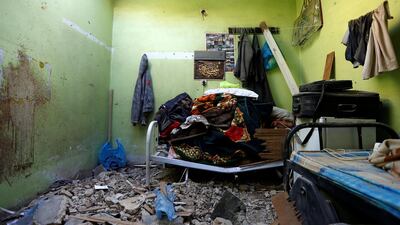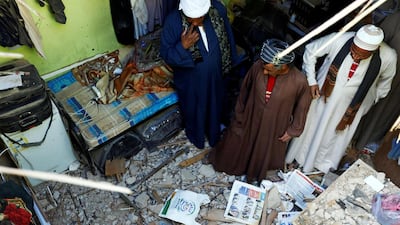Missiles fired at Saudi Arabia by Houthi rebels that left one person dead in the capital were supplied by Iran, the Saudi led-coalition supporting Yemen's government said.
Coalition spokesman Colonel Turki Al Maliki said all seven missiles launched by the Houthis on Sunday night were intercepted, but debris from one of the three missiles fired at Riyadh killed an Egyptian worker when it fell through the roof of his home. Two missiles were fired at Jazan and one each at Khamis Mushait and Najran.
Col Al Maliki told foreign envoys gathered at the coalition headquarters on Monday that forensic examination of the missile fragments showed that they came from Iran.
Displaying wreckage from the missiles, he said the attack, launched on the eve of the third anniversary of the war in Yemen, was a "deadly escalation", and "we reserve the right to respond against Iran at the right time and right place".
Col Maliki said the coalition had targeted a missiles shipment at Sanaa airport, and that the Iran-backed Houthi rebels were using the facility to launch missiles at Saudi territory.
Sunday's attack drew condemnation from Saudi Arabia's regional and western allies as well as the United Nations.
The UAE, Kuwait and Bahrain said they stood behind Saudi Arabia and supported its efforts to defend itself.
The UAE said the attacks reflected the Iran-backed Houthi militias' determination to "destabilise the region".
"These repeated attacks and hostile acts by the Houthis underscores the need for a firm stance," the Ministry of Foreign Affairs and International Cooperation said, urging the international community "to join forces to confront this serious scourge to ensure stability in the region".
In a message to Saudi Arabia's King Salman, Kuwaiti emir Sheikh Sabah Al Ahmed said the attack "violated international law, values and principles".
Bahrain said it “stands in the same line as its brother Saudi Arabia” and "continues to support the kingdom’s war on terror on all levels and fully supports any steps it may take to defend itself”, in a statement carried by the Bahrain News Agency.
The United Nations Secretary General Antonio Guterres strongly condemned the missile attacks and called for "restraint amid mounting tensions and stresses that military escalation is not the solution".
Mr Guterres is due to meet Saudi Crown Prince Mohammed bin Salman, who is on a visit to the US, at UN headquarters in New York on Tuesday to discuss Yemen.
The United States also condemned attack in a statement by the State Department. "We support the right of our Saudi partners to defend their borders against these threats, spokeswoman Heather Nauert said. "We continue to call on all parties, including the Houthis, to return to political negotiations and move toward ending the war in Yemen."
British Foreign Secretary Boris Johnson said he was "appalled" by the Houthi attack.
"Building on the recent UN Panel of Experts report, we will be calling on the UN to investigate how these latest missiles found their way into Yemen in contravention of Security Council Resolutions," Mr Johnson said.
"The United Kingdom stands shoulder to shoulder with Saudi Arabia in the face of such serious national security threats. Those responsible must cease these dangerous and provocative actions. A return to political dialogue remains vital to ensuring an end to the conflict for the sake of the Yemeni people and regional security."
__________________
Read more
Iran provides Yemen’s Houthis material for explosives, report says
UN says Iran broke arms embargo by sending weapons to Houthis
__________________
The Secretary General of the Organisation of Islamic Cooperation, Dr Yousef Al Othaimeen, said that the rebels' continuous attacks on Saudi Arabia is "hostile and criminal".
"It is an attempt to terrorise civilians and destabilise the safety and security of the kingdom," he said in remarks carried by the UAE state news agency, Wam.
The Houthi rebels have fired dozens of missiles into Saudi Arabia since last year, all of which Saudi forces have intercepted.
A major attack targeted Riyadh international airport on November 4, and another strike on December 19 targeted Riyadh's Yamamah palace — the official residence of the king.
The Yemen war was triggered when the Houthis seized the capital, Sanaa, in September 2014 and later advanced south, taking large swathes of the country.
After entering the war at the request of President Abdrabu Mansur Hadi on March 26, 2015, the Saudi-led coalition — which includes the UAE — has helped pro-government forces to retake much of the territory captured by the rebels. However, Sanaa remains under rebel control.
On Monday, which marked three years of war, Houthi rebel supporters took to Sanaa's streets. Rebel authorities ordered all schools and government offices shut for the anniversary.
Speakers played a speech by Lebanon's Hezbollah chief Hassan Nasrallah — whose Tehran-backed party allied with the insurgents — in which he praised the "steadfastness" of Yemen's people.
The UN says living conditions in the war-scarred country have reached catastrophic levels and that 8.4 million people face imminent famine.






